In 2019, I played a couple of games. Some of them were good, and some of them were Anthem. In keeping with the tradition of classical games journalism dating back to Socrates himself, here are my ranked listing of the Good Games of 2019.
You might read through this and think, "wow, you really hated these games, jeez." I enjoyed every game on this list enough to include it, faults aside. I think there's a lot to learn from the games I loved despite their problems, and so this essay tends to focus more on the negative. I recommend every game on this list, and you should play them all.
10. Fire Emblem: Three Houses
The last and only Fire Emblem game that I played was Path of Radiance, and I less so played it than got through three or four stages then never finished it. The series has never clicked with me, and I never really understood why; I love X-COM and Advanced Wars. Why don't I like this?
Turns out the secret ingredient was some Persona nonsense.
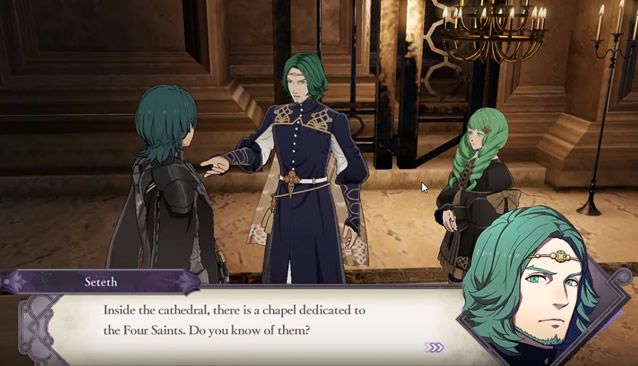
Fire Emblem: Three Houses is 33% tactical combat, 66% questionable power imbalance simulator. You can date your students! That's so messed up! Oh my god if you ignore that it's so fun!
Of the ten games in this list, Three Houses is the most flawed. A large part of this is due to the fact I played the game on Normal difficulty, which is described as being for players with limited Fire Emblem experience.
"I have limited Fire Emblem experience!" I thought, like a fool who believes things when they are told to her. "This series is supposed to be hard I think, let's go with what it recommends!"
If you have any video game experience AT ALL, do not play Three Houses on Normal I beg you.
Three Houses is on this list because it captivated me for like thirty or so hours. Garreg Mach Monastery is a joy to explore, full of mini-games and interactions between you and your students. You can cook! You can give advice! It's a Japanese RPG, so it has the legally-required fishing mini-game! So many options!
Three Houses is not on this list because of the combat. It was, for awhile, but on Normal difficulty the game quickly becomes trivial to the point of tedium. Your students become so laughably overpowered that the individual missions become rote, your students so adept at murder that it's more than a bit unsettling. I wish I could've upped the difficulty to Hard, but Three Houses is a game that makes you pay for your foolish "listening to their recommendations." This sucks. Don't do this, other games.
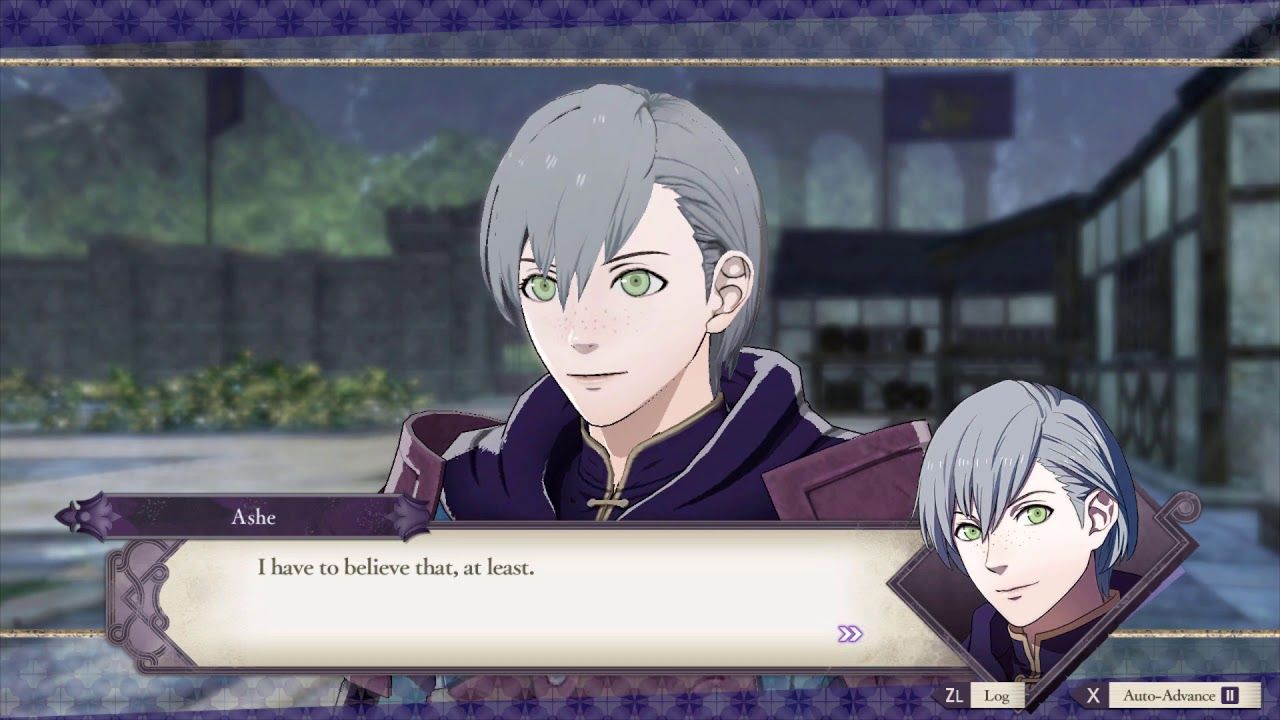
Still, the combat was still enjoyable for at good 20 hours, which is more than I can say for a lot of games. The story lines of the individual students often have a surprising depth, and the game never shies away from commenting on social issues - unless that issue is queer people, where Fire Emblem remains disappointing. While the dearth of queer relationships didn't affect me personally, given that I'm an ace person who never bothers with game relationships, it's still a black mark against the game's otherwise decent-to-excellent writing.
The characters in Three Houses prop it to one of my favorite games of the year, and the Three Houses memes on Twitter are a testament to that. If you've already played the game, do yourself a favor and check them out because I love them.
9. Disco Elysium
Alright, here we go.
I like Disco Elysium. It's very well written and has an interesting world and politics that, while not necessarily unique, is fleshed out and feels lived-in. A lot of consideration went into crafting the scenarios that Disco Elysium presents and the themes inherent within, and it does so with a depth unparalleled by maybe any game ever. It's a fascinating piece of media that makes me anticipate whatever developer ZA/UM creates next.
That said, I don't think it's a particularly good game.
And this is something I struggle with when it comes to critiquing video games. There are a lot of games that excel at gameplay and pay little attention to story when it comes to narrative and world beyond providing an aesthetic. They use aesthetic as a self-advertisement, as if to shout, "Hey, you like this sort of theme, why not give this a try?" My favorite game of 2018 was Into the Breach, a game I consider a masterful demonstration of game design; every piece of that game interacts meaningfully to create a tightly conceptualized, harmonious decision space that presents meaningful challenge that never blindsides you - the one way the game can "screw" you with randomness, Vek spawn locations, is offset through another randomness mechanic, grid defense. The systems of that game compliment each other so precisely that it's a rare game that, to me, felt entirely necessary in its design. It's the rare game that achieves the ideal that "perfection is is achieved when there is nothing left to take away."
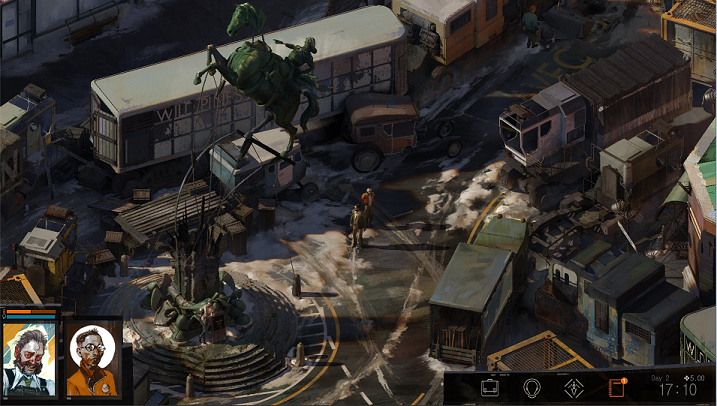
Disco Elysium is the antithesis to Into the Breach, which I realise comes off as a very weird statement now that I'm making it. Disco Elysium is game of pure narrative, a Twine engine text adventure on steroids. The game mechanics beyond the choose-your-own-adventure dialog trees consist of leveling up statistics, walking around, picking stuff up, and some dice rolls. That's it.
That isn't a fault in itself. I just waxed poetic about refined, clean design for, like, way too long, after all. But despite the simplicity at the surface level, most of Disco's gameplay never felt necessary to me. Your character meanders through Revachol with a lack of urgency, resulting in long stretches where the game eschews its narrative strengths in favor of lackluster open world exploration. Revachol is a small city, but even if you double-click to run through its messy streets, it still takes long enough to traverse that I couldn't help but roll my eyes when the narrative lead me back to somewhere I'd just been. I don't think the physical world of the game is superfluous entirely; it has a visual style that fits the tone of the game quite well, and does some interesting things with certain in-world interactions that I enjoyed, though they were far too infrequent to overcome my issues with Disco's pacing. Still, I found myself thinking the game actually would be better off as a Twine game, or maybe a more traditional point-and-click adventure where you navigate between discreet screens. When Disco Elysium gets slow, it gets slow.
There are three core mechanics to Disco Elysium that I think are worth discussing: skills, thoughts, and clothing. I have problems with each, though the skill system is unique and I think the strongest part of the game.
Disco Elysium features 24 different skills, each with a vastly different purpose, and interestingly, their own flaws. Improve Encyclopedia, and you'll get tidbits about the world, but you'll find yourself doubting the characters you interact with as your brain nitpicks the details they provide you. Put points into Empathy and your brain will interject with a better interpretation of the mood of your current conversation. Put too many points into Empathy and you'll find yourself breaking down mid-conversation as you take on the mood of the room a bit too strongly and lose your composure. It's an incredibly deep system that rejects traditional video game conventions in the pursuit of emergent depth, and my only real complaint with it is that, as far as I can tell, the game never prepares you for this. Since, also a far as I can tell, there's no way to undo a point allocation, you can find yourself burned by this if you're not prepared. Disco believes you should roll with your mistakes, and while I do think that's laudable, it's also frustrating to come to terms with halfway through a 25 hour-plus game. I think it'd be a fair ask for a second playthrough or a sequel, but from the onset I wish the game was just a tad more forthcoming with its expectations.
As you stumble your way through more conversations, the game will try to pick up on patterns in your answers and present you the ability to double down on those convictions accordingly. Express sympathy for the plight of the worker enough times and your character will get the ability to spend a skill point to internalize your self-evident Communist inclinations, "locking in" the thought and providing benefits accordingly. Put yourself down too many times and the game will let you really just lean in on that self-deprecation. Like most things in Disco Elysium, it's unique, but a bit clumsy. The thoughts I wanted to internalize were the ones that I'd... already internalized. Yes, my cop was a feminist because I picked feminist options. I already knew that. Spending a skill point to lock it in didn't provide any sort of accomplishment, as if I "earned" anything by unlocking the thought and it's associated bonus. It just came off as wasting a skill point to tell the game something it had already figured out and maybe get a plus-one to a stat out of it, or the ability to heal from picking certain dialog options (a perk that I never found useful since the game is pretty liberal about providing you with healing items).
Where Disco Elysium is at its messiest, however, is the deluge of stat-enhancing clothing the game throws at you. See, Disco Elysium is an CRPG, and role-playing games have gear, dammit. Put on a hat and you'll get a small boost to your Encyclopedia. Put on a different hat, and you'll get an even bigger boost to Logic, at the cost of Perception. Why does the first hat make you know things? I have no idea, and the best I can come up with is because in video games, gear has stats, and Disco Elysium is a video game, after all.
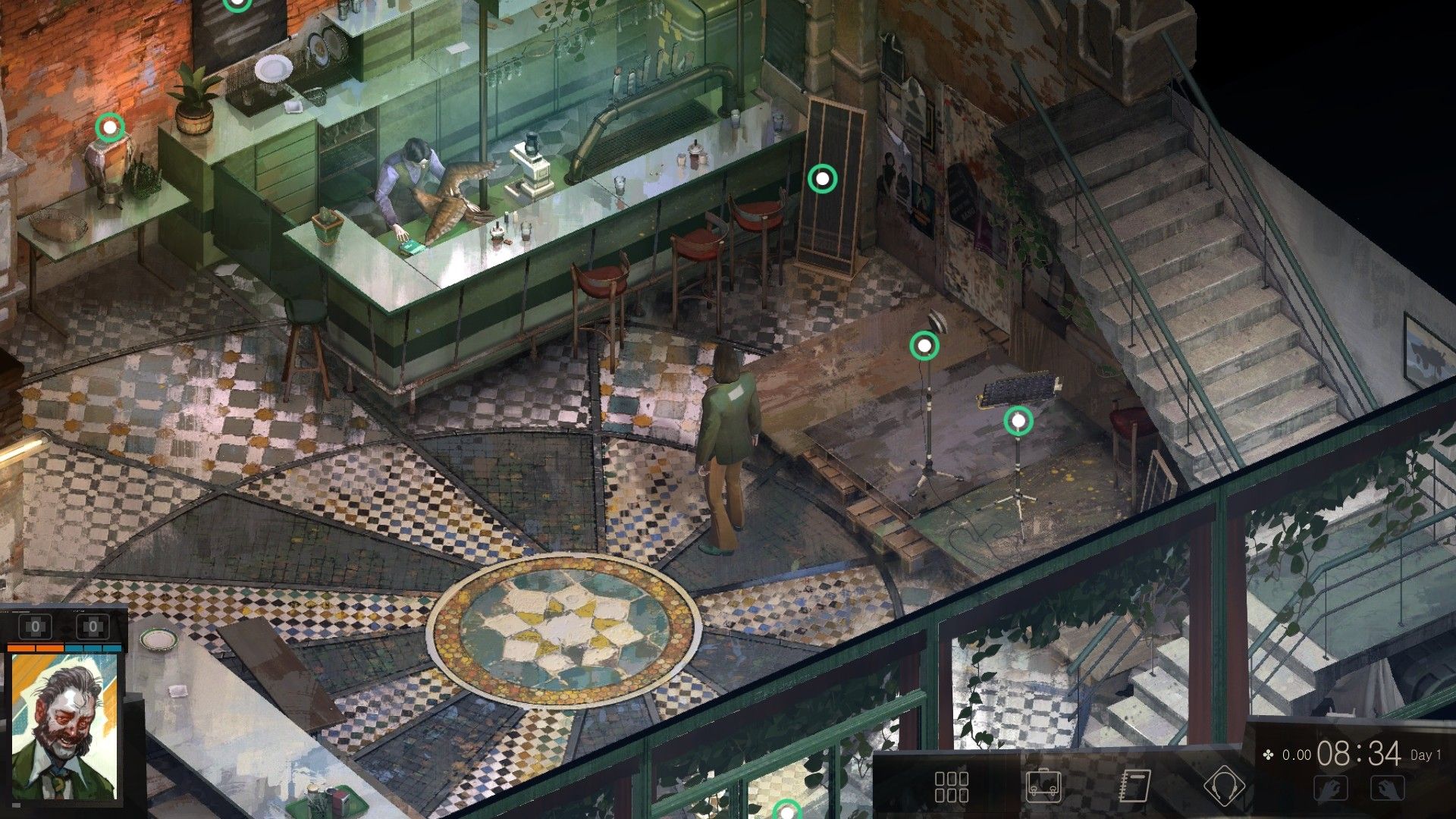
Managing your clothes is never enjoyable. Sometimes the game presents a series of checks, the game's pass-or-fail dice roll mechanic that pits your stats against a preset difficulty threshold in the style of a tabletop RPG, and you're left hoping the checks are for skills that benefit by your current shirt and hat. Other times, the game provides one from the root-level menu, and so you go into your inventory, equip all the clothing that gives a bonus to Hand-Eye Coordination before challenging it. It's an arbitrary system that results in tedious inventory management as you scan through your increasingly large collection of apparel to find the three or four that apply to the situation at hand. Maybe I wouldn't mind it as much if the game provided a quick way to equip all the best-in-slot you possess for a specific check, or even something as simple as gear loadouts. As it stands, the only aspect of the mechanic that I actually enjoyed was when I got a new piece of gear, an experience that isn't unique to Disco. I've played enough Final Fantasy XIV and Destiny 2 to know that I'm always here for gear, and while Disco does scratch the clothing acquisition itch, it does so only because I'm hard-wired to like digital clothing, not because I'm actually excited about anything intrinsic to the collectibles themselves.
There was a point where Disco Elysium was probably in my top three or four games this year. I was generally enthralled with its side stories and the development of my character, and impressed as they reflected myself in increasingly accurate ways. This fell apart in one specific interaction that I won't spoil outright. My character was dancing, unwinding a bit from the tension of solving the murder that defines the game's core plot. The game presented me with the opportunity to try and convince Kim, my fictional cop's partner, to dance as well, who resisted. I succeeded on a series of checks, only to fail on the fourth or so.
Frustrated with his ability to convince Kim to join in the revelry, my character burst into a screed of racial attacks against the one friend he had, despite me playing them up until now as a dedicated social justice advocate. The conversation ended, and I sat there, shocked, yet, confused more than anything. It was a moment that felt completely out of nowhere for the character I had cultivated over my time with Disco Elysium, to the point where I wondered if it was a bug in the behind-the-scenes logic that dictated that particular scene. The skin of Disco Elysium had peeled off, revealing the animatron behind. I played maybe an hour or so after that, coasting off my lingering intrigue of the game's main plot, and have shelved it since then. Maybe I'll go back and finish it up; I hear the end is very good. I've considered it a couple times, but I can't help but dwell on that one conversation. The magic of Disco Elysium, the promise of a deeply personal journey of your character's development, crumbled for me, and I can't get it back.
I'm sure the most die-hard of Disco fans will insist that I must've made some choices in the past that lead to this, but really I don't think I did. I'm bad at playing characters outside my personal morals; all of my tabletop characters trend towards Good, no matter how they start. The only thing I can think of that might've caused this is I did have my character wear a shirt that featured a character from a series of in-lore racist books for a few moments to pass a check or two. Maybe Disco is trying to make a statement about the use of problematic imagery for personal gain - if so, that's a commendable point, had the game ever addressed it. Instead, I was left to scrounge for some rationality for my character's heel turn, and the explanations I landed on leave more questions than answers.
8. Ring Fit Adventure
My god, they've done it. After decades, Nintendo has achieved their true goal: to make a fitness game that's actually good.
Ring Fit Adventure is Nintendo's latest attempt to gamify fitness. It's the spiritual successor to Wii Fit, except, like, a real game, and actually strenuous. I picked it up after hearing a surprising amount of praise for it, and y'know, it's pretty darn good.
As you make your way through the Breath of the Wild-inspired environments (by running in place!), you're periodically interrupted by turn-based encounters. Rather than navigate through some menus, Ring Fit provides you with a wide array of "attacks", some of which require you to either interact with the included Pilates ring. If you do the exercise well, your attacks do more damage. It's a very simple combat system, but that's a positive for this game. It allows you to focus on the exercise, while still being entertaining enough to distract you from how sore you are.
Because Ring Fit will make you sore. The game is constantly trying to tweak the difficulty to match your fitness level, and it will punish your hubris. I thought I was prepared for the difficulty it suggested, and while I made it to the end, god it sucked.
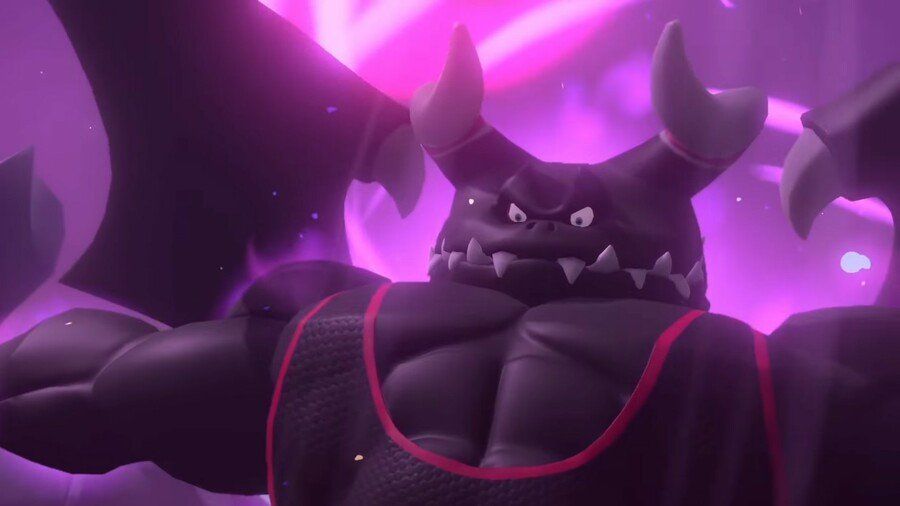
As you carry out each exercise, the game will provide tips for improving your form based on your movements. It's caught me so many times when I star getting tired and let my form slip, keeping me honest in a way that that'd be hard to achieve without a personal trainer. It's impressive how much thought went into ensuring the game was truly instructional, when it could've just as easily been a window dressing around a series of somewhat interactive exercise videos. Nintendo's attention to detail is what makes Ring Fit more than a short-lasting distraction and instead a charming, enjoyable tool for self-improvement.
7. Sayonara Wild Hearts
The way I engage with music isn't necessarily normal, I'd say. I have a tendency to hear a song, add it to my stupidly long Spotify playlist, then listen to it on repeat until I burn out on it so hard I'm done with it what might as well be forever. I did that so hard with Sayonara Wild Hearts' soundtrack, a synthpop-inspired collection of absolute bops.
Sayonara Wild Hearts is the only game on this list that I played on two systems: the iPhone, and the Apple TV. My first impression with this game, on iPhone, was that it was just awful. The touch controls don't move your neopunk motorcyclist character fully across the screen, and picking up your finger and dragging it twice is just not precise enough for a game that is essentially just those levels in Sonic where he's running toward you. I made it through four stages before putting the game down and resigning myself to just listening to the soundtrack separately.
And instead I hooked a Dualshock 4 to my Apple TV and my god it's so much better.
Sayonara Wild Hearts is a game that lives and dies on its aesthetic. Each track matches with the hyper-stylized world decently well at the game's worst, and flawlessly at its best; Parallel Universes in particular meshes song and gameplay creatively, so much so I was left wishing that the other stages were as inventive.
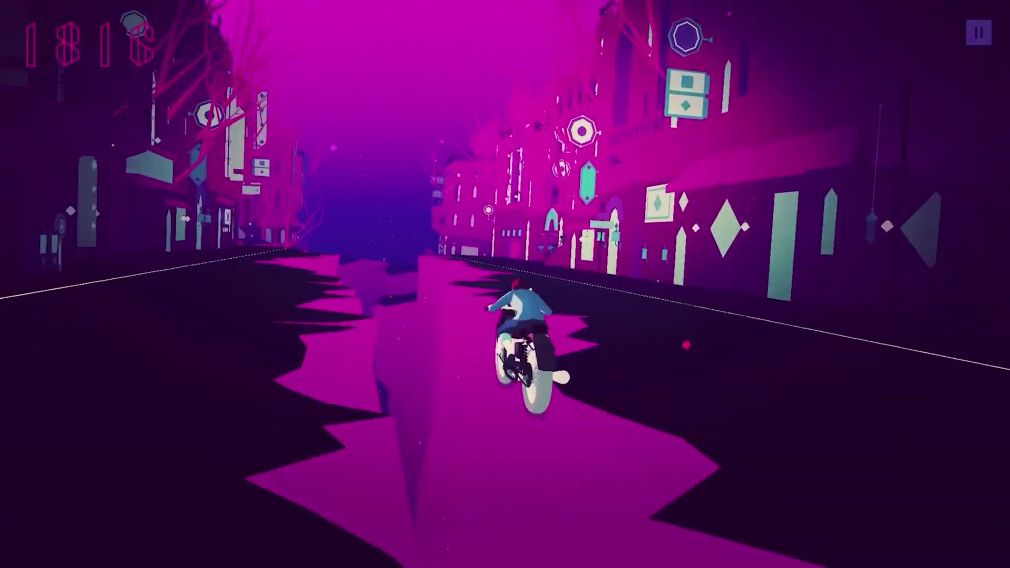
The decision to release this game on iPhone at all is questionable, and I doubt would have occurred were the game not a launch title for Apple Arcade, which mandates that its games be cross-platform across Apple's catalog of devices. Playing Sayonara Wild Hearts on a 5.8 inch screen reminds me of Game Boy Advanced Video (Remember those? When they released full episodes of animated shows on the Game Boy Advanced?). Like, you can experience it that way, but the method of conveyance limits the impact of such a visual work.
The cryptic story of Sayonara Wild Hearts is over quickly, but ends with a touching moment that I'll not spoil - it's a two hour game, and it's worth your time, especially if you like neon-punk aesthetics or pop music.
6. Tangle Tower
Tangle Tower is a point-and-click adventure game. It adds nothing new to the genre. If you told me that it was a remaster of a lost late-90s Lucasarts game, I'd believe you. And I'm very here for that.
It has all the charm of Curse of Monkey Island (still my favorite adventure game) with a bit of Professor Layton's puzzle solving and "wait what" mystique sprinkled in. Tangle Tower does nothing special, and I don't think it needs to. It's well animated, well voiced, and the puzzles are generally straightforward enough to not be frustrating, though they do lean towards the side of trivial.
There's not a lot to say about Tangle Tower besides that I found it delightfully pleasant and well-polished. I appreciate that every character has unique, voiced dialog for most of the evidence you can find and ask them about, much of which is genuinely funny. It's a cute game that's not too long and worthy of an afternoon or two, plus it's on Apple Arcade if you already subscribe to that.
Penny is my favorite character of the year. She's a self-taught ornithologist with a trans-Atlantic accent with an undercurrent of pettiness and she is wonderful.
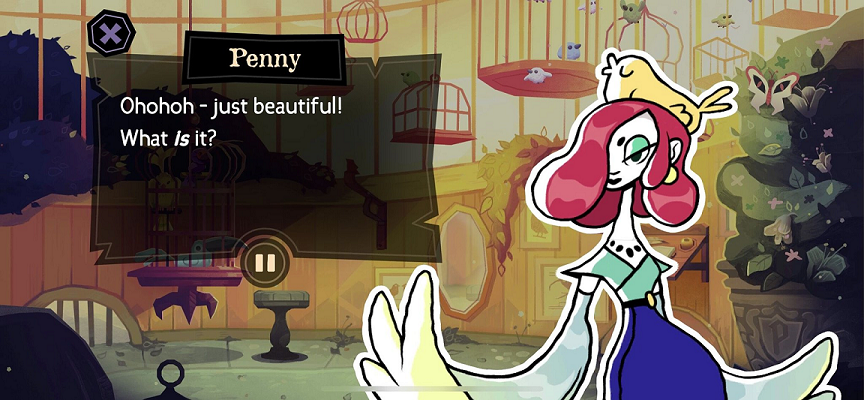
5. Destiny 2: Shadowkeep
I am a shameless Destiny apologist. I liked Year One. Since the game moved to Steam on October 1st, I have played about 350 hours because I am an insane person. I believe it is one of the three most influential series of the decade (the other two being Dota 2 for monetization reasons, and the Dark Souls franchise for "the Dark Souls of X" comparison reasons). It's a comfort game for me, and the only way it wasn't going to make my top 10 was for Bungie to screw up in such tremendous fashion that it sunk the franchise.

Shadowkeep is the most Destiny that Destiny has ever been.
The story is okay. It's fine. It's fan-servicey in a way that seemed to really resonate with veterans of the first game, which I did not play since it didn't release on PC. As always with Destiny 2's narrative, the best storytelling comes from the lore books, and the expansion's quest line serves to add a few more threads to the list of unresolved plots and show off a few impressive set pieces. It was fun, if not a bit short.
The strength of Shadowkeep lies in its endgame content. The Master difficulty Nightfall is a fun challenge that, in most cases, strikes (ha ha) a good balance between execution and preparation. The new Champion enemies are interesting, though they exasperate design failures inherent to Destiny's revamped Year 3 systems that I'll touch on later. The first Master Nightfall I completed was exhilarating without running into the bash-your-head-against-the-wall-until-it-works agony that Destiny's group content constantly skirts against. Some weeks, it hits that; trying to finish the Master Nightfall version of The Scarlet Keep, the strike introduced in Shadowkeep was one hour and fifteen minutes of grind that ultimately ended in nothing when it got too late to continue. It's an experience that depends on what encounter the game randomly selects for the week, but when it works, it works.
As always, Destiny excels in its raid content, delivering an experience in Shadowkeep that rivals the best in the history of the series. Garden of Salvation adheres to the design philosophy common among post-Leviathan raids; a core mechanic is introduced in the first encounter and expanded upon in subsequent encounters with some miscellaneous additions, finally culminating in an end boss that tests all the skills you've developed thus far. The final encounter of Garden is the second hardest encounter they've designed in Destiny 2, if my failure count has anything to say about it. None of the mechanics are difficult to grasp once you're exposed to them, but the Sanctified Mind grants your six person fireteam very limited room for error. It's a quick encounter that feels like an accomplishment when you succeed. It's a nightmare when your team isn't up to the task. My first time through the raid, it took me three groups to find one that could complete it, and at the end I found myself reclassifying the experience from "my least favorite Destiny raid" to "the best raid since Last Wish." The singular black mark against Garden is the number of lingering issues plaguing the final encounter. None of them are so game-breaking that they prevent you from finishing the fight, but they're all just frustrating enough to hurt the experience when they arise.
The lead-up to Shadowkeep was defined by the gameplay overhauls Bungie announced months before, most prominently Armor 2.0, the rework of the mod and stat systems introduced in the base game. Under the design goal of "RPG-ifying" the game to appeal to the hardcore Destiny audience, Bungie changed each armor drop in the game to randomly roll six different stats as well as an elemental affinity that determined the mods that that armor piece could accept. Tossing away the "random rolls" mindset where every piece of gear came with two random perks (a system still in place for weapons), the random gear grind of Shadowkeep is now one of finding the armor piece with the stats that match your intended build, widening the space for interesting builds.
This system is both a success, and a failure. The truest constant of Destiny's history is the "two steps forward, one step back" quality of every major change the game introduces. On paper, Armor 2.0 provides a much deeper space for players create truly inventive loadouts that drastically increase the breadth of play styles supported by the game. In practice, the system is held back by artificial limitations. Only some of the game's wide assortment of clothing can roll with high stats, limiting both personal expression as well as the opportunities to get excited about a piece of loot. Destiny has always struggled with its core identity as a "looter shooter", and while Armor 2.0 is still a step up from the limitedness of Year 1's static rolls (gear rolled with two predetermined perks, resulting in a bafflingly shallow loot system), it remains hamstrung by a design that, as of the time I write this, remain unexplained.
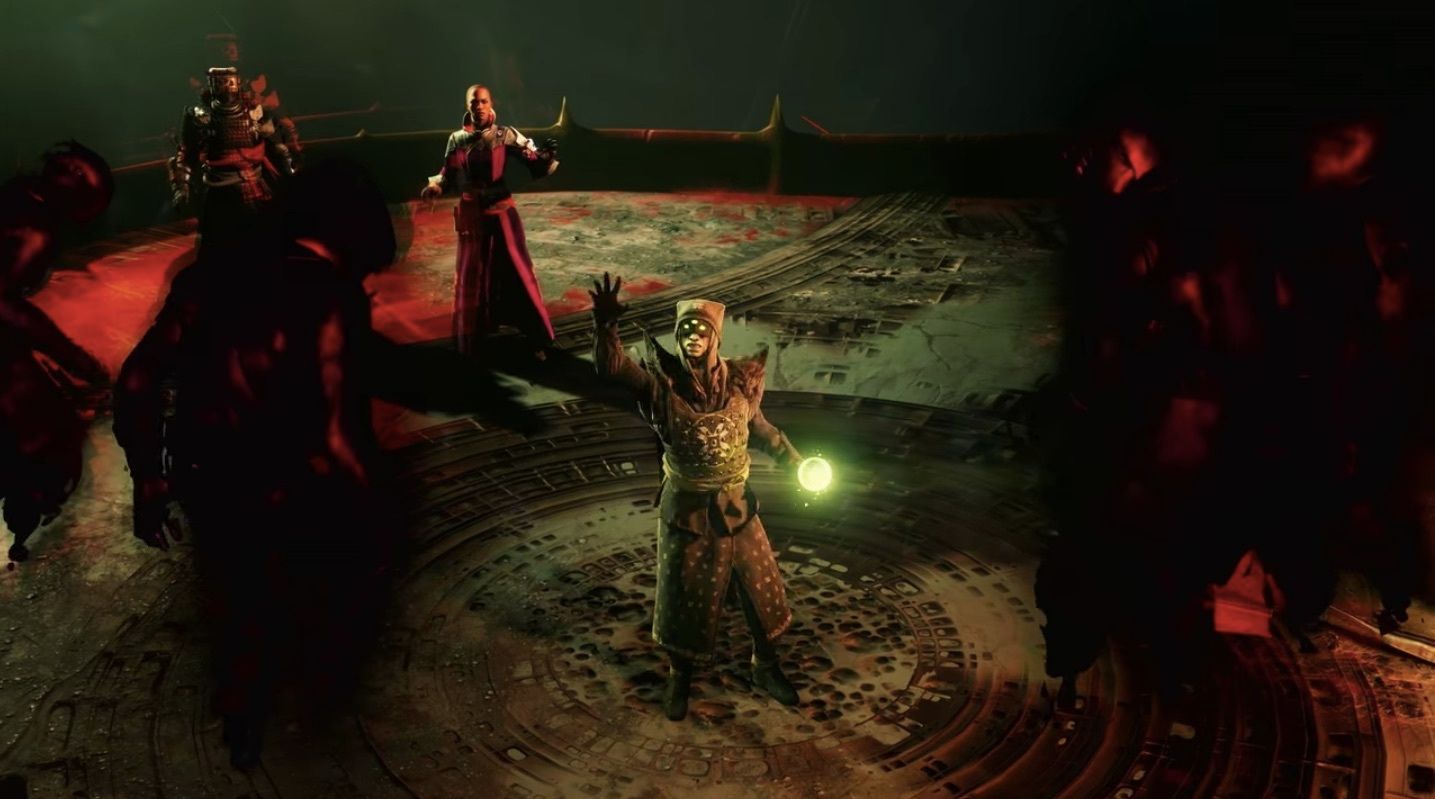
The small subset of useful drops is even further restricted by the elemental affinity system that prevents certain mods from interacting with each gear piece. The mod you want to use might require Void armor; if you finally get the piece of gear you wanted with good stats, you have a one-in-three chance of getting the right affinity, so you'd better get your prayers in now. It's a degree of randomness that fails to accomplish what I imagine to be its intentions: to make the sensation of finally getting that perfect drop all the more rewarding. It's hard to hit the right balance between frustration and satisfaction, and the general consensus among the Destiny community is that right now, the scale is tipped heavily towards frustration.
(As a disclaimer, the Destiny community is the most backseat developer gaming community I've experienced, but in this case I happen to think they're correct. Not on the solutions, necessarily; I don't pretend to know that either. But they've diagnosed the problem well.)
The takeaway from my grievances with the current state of Destiny 2's core mechanics might come across as that it's currently in a bad state, and that it's inclusion on my list is at odds with its quality, but my thoughts on Destiny come from the stupid amount of time I've spent playing it this year, almost all of which flush with satisfying social experiences. I care enough to dissect Destiny because I really enjoy Destiny, and Shadowkeep delivers more of those experiences while laying the groundwork for future refinement. Coordinating a group of six people through Destiny's raid content feels like an accomplishment every time, and while Shadowkeep may stumble in the details, it still manages to deliver what I still consider the best social experience in games right now.
4. Hypnospace Outlaw
In writing this article, I'm recognizing that I really like detective games, and Hypnospace Outlaw is a detective game for people who miss the <marquee> tag. I'm literally a user interface engineer by trade, so I shouldn't miss marquees - they're terrible - and yet deep within me, in my heart of hearts, I can't help but feel a longing nostalgia for the days of "Under Construction" gifs and page view counters.
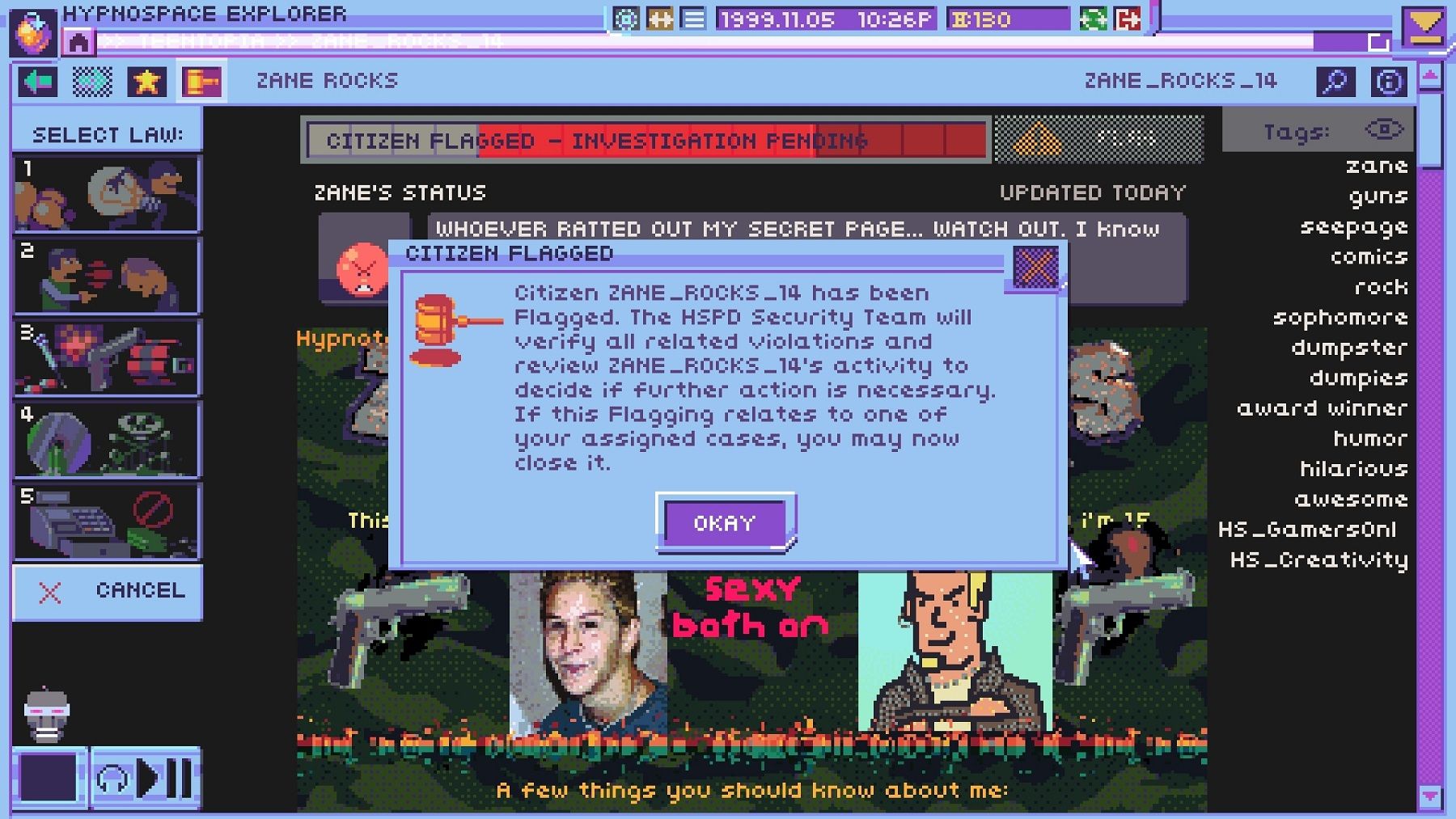
Hypnospace Outlaw is a love letter to the early days of the internet, where the computer-savvy made ramshackle web pages about whatever they loved most, complete with auto-playing music and animated flames. It harkens back to the days when the internet was the World Wide Web, an idyllic concept space of seemingly infinite potential for human connection. "The Internet will unite humanity," people thought, "and generally be very good for everyone with no side effects at all."
(I still think the internet has done far more good than bad, but that conversation doesn't need to happen in this essay about ranking video games.)
In Hypnospace Outlaw, you are a volunteer moderator for the titular service, an alternate reality internet specially designed the newly released HypnOS, an operating system you interact with via brainwaves in your sleep. Tasked with cleaning up bad actors by Merchantsoft, the fictional tech firm that developed the technology in the game's lore, you navigate between the home pages of Hypnospace's diverse user base, reporting copyright infractions and incidences of harassment.
The moment-to-moment gameplay of Hypnospace is thin, mostly serving as a tool to direct you towards more of the game's retelling of the 1990s. An electronic music craze captivates the youth, and the old guard of the Hypnospace music community respond with derision. The geek and fandom community finds themselves neglected by Merchantsoft due to their lack of marketability and tries to make a stand, only to fall into nerd community drama that is way too accurate. The game touches on sexism in software engineering and the toxically masculine culture of the early internet, the legacy of which we still feel today, with the same casualness it presents a thirty second loop of a faux-Linkin Park song on a self-conscious, image-obsessed teenager's fan page.
Hypnospace Outlaw is a ridiculous game about a ridiculous time. Everyone that used the internet from the late 90s to early 2000s remembers their most embarrassing interactions with the Web. Hypnospace champions them not as memories that won't go away, but rather as snapshots of a cultural moment worth preserving. It's an experience that's best when it's parodying that particular zeitgeist, and it does so with an dedication and attention to detail that brings the age of <table> layouts rushing back so much that bwl, Hypnospace's substitute for lol, feels almost familiar. (It means bursting with laughter, if you're curious.)
While there is a core narrative to Hypnospace Outlaw that does present a few surprises, it paces itself erratically and culminates in a fairly unfulfilling way. Hypnospace Outlaw does tell a decent story about the early days of Silicon Valley and its hubris, but like the internet itself, it's better remembered as its users, not its creators.
3. Final Fantasy XIV: Shadowbringers
Final Fantasy XIV is an important game to me - maybe the most important. The social interactions I've had in that game indirectly lead me to better understanding myself, something I can say about few pieces of media. A lot of people - most, perhaps - can cite an example of self-realization through an independent consumption of a work of fiction; a book or a film, perhaps. I don't think I've had that experience. Perhaps I just forgot, but the moments that come to my mind are ones of shared experience and the clarity that comes from opening oneself to others and having them respond in kind, only to learn that this person you respect and whose company you enjoy sees the world differently than you, not in a bad way, but in a way that makes you realise that these thoughts you have are not universal, and that you've normalized them because you don't know any better, and because you're afraid of recognizing their implications. The mechanics are the same as the revelation by way of fiction; it's an incident that comes from exposure to differing experiences. The difference is one of intimacy and the barriers you lower through self-expression, and understanding that need for me was a transformative moment in my life, the gravity of which will never be surpassed.
In Shadowbringers, you fight an ancient demigod with wings covered in haunting masks and it is rad.
Final Fantasy XIV has had an... interesting life, to say the least. The original release was so poor that Square Enix apologized for it, handing the reins over to current lead Naoki Yoshida who proceeded to reboot the project into A Realm Reborn, a re-imagining of the original game that took some of its systems and melded them with some of the design choices made over what was then nine years of World of Warcraft, creating a game that resembled its predecessors in the MMO space but with a greater emphasis on storytelling that underlies the body of Square Enix's first-party work, for better and for worse.
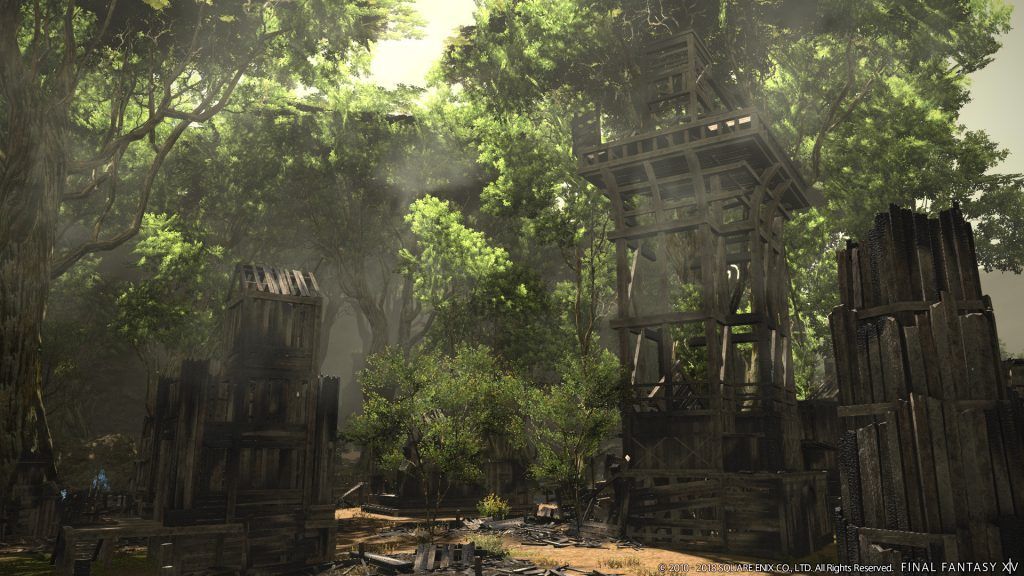
At the time of release, A Realm Reborn was one of my favorite games I had ever played. I remember nothing about its story, a fact which really undermined a major revelatory moment in Shadowbringers as well as one in the game's second expansion, Stormblood, which I also played this year. I do know that it has not aged well. Final Fantasy XIV is notorious for the 2.0 Main Scenario Quest, the series of main plot quests that released with A Realm Reborn and its subsequent patches leading up to the game's first expansion, Heavensward. In order to experience the story of Shadowbringers, you must first complete hundreds of meandering fetch quests from A Realm Reborn, both predecessor expansions, and the forty-odd additional quests added in the between-expansion patches. People often say that Final Fantasy stories don't get good until forty or so hours in. Final Fantasy XIV gets good at about a hundred, and gets great around a hundred more.
It's an interesting problem to discuss because it's not an issue born out of the usual from the normal sources of this criticism. XIV is not the slog it is today if you've been playing it since A Realm Reborn's release in 2013. If you've subscribed that whole time and kept up with the periodic additions to the Main Scenario Quest, Shadowbringers is the best the franchise has ever been, and perhaps the best in the entire MMO genre. But that triumph is one built from six years of legacy. The development of the Scions of the Seventh Dawn from an ad hoc group of one-dimensional half-committed insurgents into a closely knit group of genuine friends, each with deep connections to each other and the player character is one that does require the preceding story to have the emotional impact the game attempts - and succeeds - to create. The cast of XIV experience grew up with the game itself, and it makes the game's early attempts at storytelling feel amateurish in retrospect.
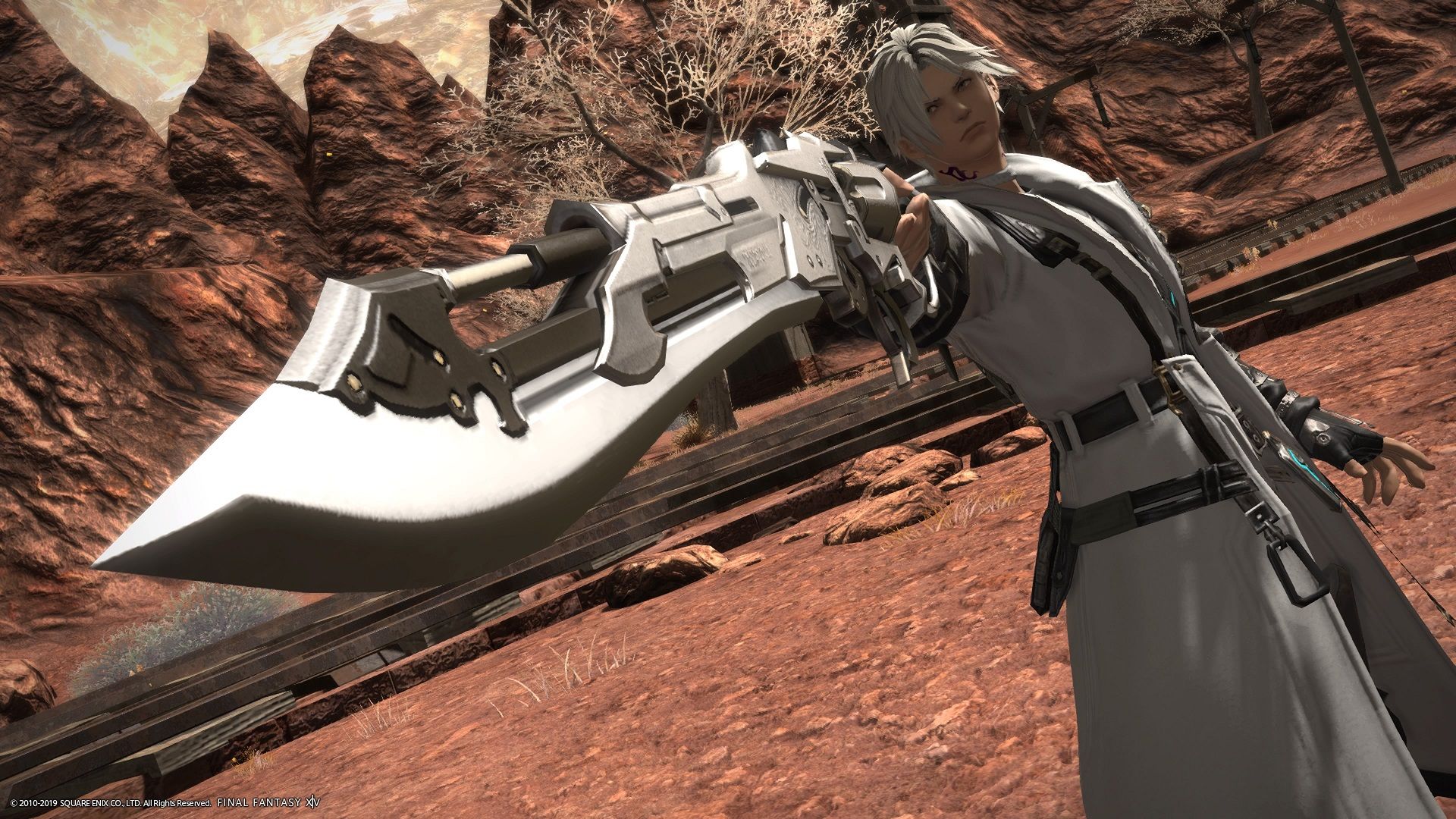
This is not an unsolvable problem, mind you. The XIV team has announced plans to revamp the story of A Realm Reborn, cutting out the (frankly ridiculous) amount of padding in the base story, a remnant of a need to release a full game that respects Final Fantasy's legacy of overly long narratives despite the frantic development cycle induced by a need to recreate the game that necessitated an apology by a company on the brink of collapse. I enjoyed 2.0's story when it came out, but even at the time I remember a deep frustration with its meandering pace, most notably a series of quests where a researcher sends you to collect something only to tell you he accidentally told you the wrong thing to collect, oops, go do it again! when you return. 2.0 was rough. I love it nonetheless.
Shadowbringers is my third favorite game of the year largely because of the impact the game has had on me over time. I think its story is tremendous and kept me constantly trying to imagine where it might go next only to surprise me time and time again. The expansion's trials, the eight player boss fight encounters interspersed throughout the primarily single-player story, are some of the best the game has ever presented, all of which feature what I consider the best music in any game released this decade other than Persona 5. The last Main Scenario dungeon melds storytelling with traditional four player MMO content inventively and with a sense of gravity unparalleled by any of its contemporaries.
But XIV is a game that requires buy-in, and a lot of it. If you haven't experienced this game yet, you probably shouldn't, at least until the 2.0 story rework is released. The meta-story of the game's literal story is one of highs and lows, an once engaging 2.0 that fails to hold up to scrutiny in retrospect, followed by a first expansion that remains genuinely worth experiencing due to its themes of institutionalized bigotry and the erosion of societal identity in Heavensward, only to stumble with poor characterization and pacing in Stormblood before finally reaching an apex that relies on this sine wave of success and failure. All of this is necessary to appreciate Shadowbringers for more than its direct plot. It's a grandiose narrative of struggle and desperation that's so much more meaningful if you've shared that struggle with its characters. If that sounds worth it to you, then I can't recommend it enough, but the price to get there is steep.
2. Control
When I originally planned to write this list, Control was my number one, my Most Good Game. Control might be the most impressive demonstration of world building I've seen in a video game, one of maybe two games I've played where the plot was less interesting than the environment in which it took place (the other being Destiny, and while I think Destiny's lore is very good, this is more of a statement on Destiny's lackluster main plot).
Control opens with protagonist Jesse Faden stumbling upon the Federal Bureau of Control, the government agency tasked with finding, containing, and understanding paranormal events a la X-Files or Warehouse 13. She enters the front door to the concierge, and... there's no one. As you search around to figure out why, you quickly stumble upon this memo:
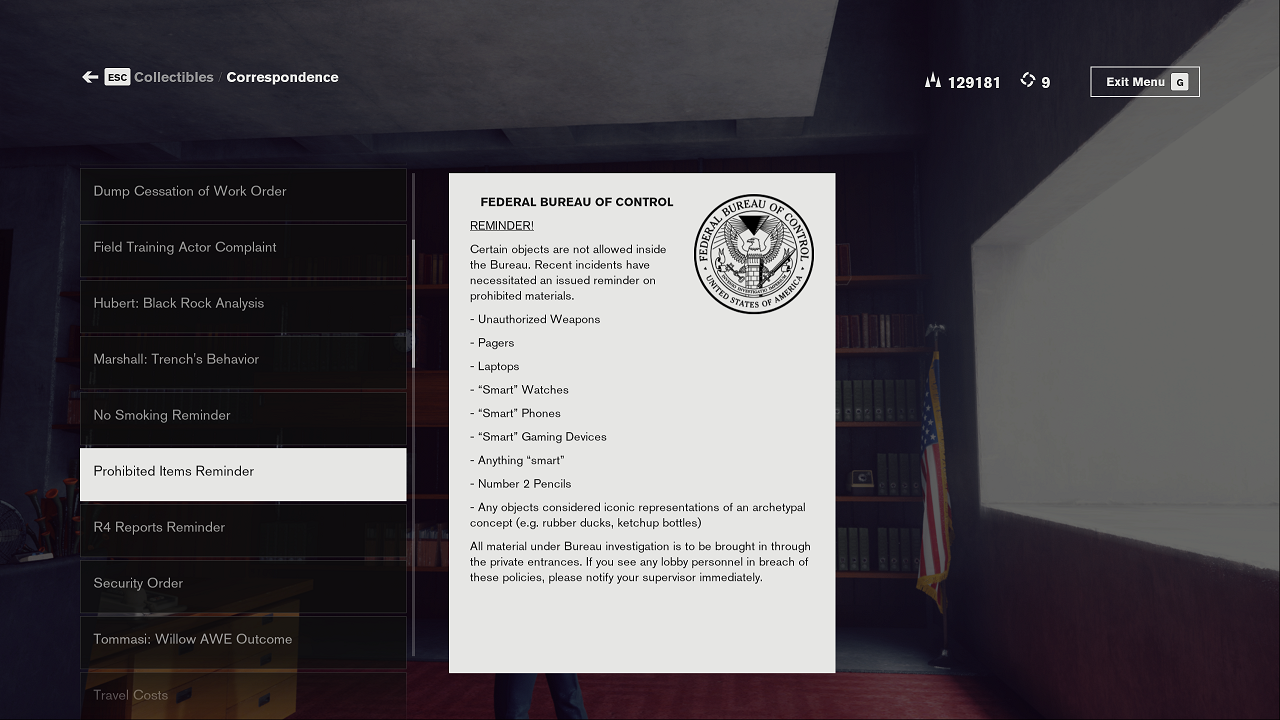
Every collectible in Control feels like this one: a dash of the weird, eerie, and unusual sprinkled into the mundane regularity of government bureaucracy. And they are all fantastic. As you progress through the game, you collect more memos, correspondences between Bureau employees, and research documents on the day-to-day of Bureau life and the terrifying objects it detains.
This drip feed of world building gently expands the game's universe over time through defining its rules and situations rather than exposition, and it results in a game world that becomes addicting to explore. It's reminiscent of Destiny's lore books, the pieces of micro-fiction that are thrown at you when you complete certain challenges or accomplish certain tasks. But where Destiny presents anthologies, Control offers artifacts, pieces of the world carefully extracted rather than stories told by its inhabitants, and this adds volumes to the immersion of Control's alternate reality. My goal in Control became searching the labyrinth of rooms that are the Oldest House for the next administrative bulletin, book report, or full motion video puppet show.
That's not to say the actual plot of Control is uninteresting. The story of Jesse's search for her brother and their connection to the Bureau was interesting, though it did falter at the end in a way that seemed rushed. That story is that of one person, however, while the memos told a larger tale of the world itself and its history that no individual narrative could rival, no matter how well told.
You might notice Control is not my favorite game of the year. It's unfortunate for Remedy that it came out in the same year as my number one, one of perhaps five games I've ever played that could keep it from this illustrious accolade I award once every, like, three years when I remember to do this. Control stumbles in its gameplay, a mix of third-person shooter, open-world adventure, and loot game that never manages to truly mesh.
As you progress through the story, Jesse gains access to more forms for her shape-shifting gun as well as a menagerie of paranormal abilities. The shooting is decent, a far cry from gunplay standouts like Destiny and Remnant: Through the Ashes, but never distracting. Between the array of magical powers you slowly amass and the overheat-and-wait-for-cooldown "ammo" mechanic, the game's combat feels like the first Mass Effect, a game that I love but I would not call a good shooter. While the powers are well varied and combine to form a solid toolkit, I was left wishing the game did a little more with their progression. Control features a leveling system complete with a skill tree for each of your powers, but none of them provide anything more interesting than some numbers changes. The game comes off as afraid of trivializing its combat by way of unbalanced upgrades, a decision that tonally clashes with the reality-breaking rules of its world. Ironically, combining one of the upgrade trees with a good mod or two makes one of the powers hilariously strong against almost anything the game throws at you through sheer force of +50% Damage.
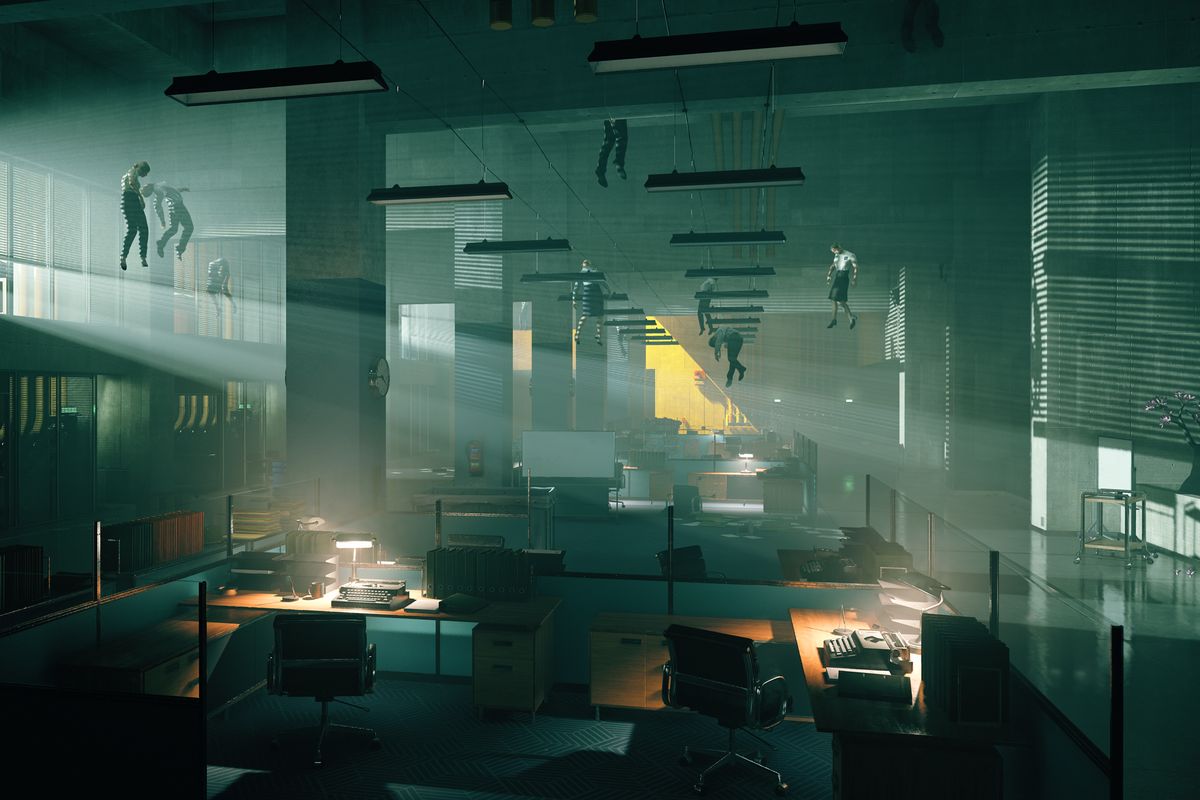
Control is not a hard game... until it is. Most of the encounters consist of a ten or so enemies that Jesse can quickly dispatch with a few shots and a bit of paranormal magic. The game's boss fights, however, almost universally present a surprising difficulty spike that always caught me off guard. The first major boss fight in the Communication's department shows up without warning and decks you across the face. "No, you can't just throw things the whole time", Remedy tells you, arms crossed. "Use some gun mods, dammit."
And speaking of mods, Control apes the first Mass Effect another way by constantly dumping useless garbage at you. Control is, weirdly, a loot game, giving you random drops from enemies and chests complete with the white-green-blue-purple color rarities that, somehow, became the only standardized thing in all of software. Jesse can equip up to three mods to improve her guns and abilities. None of them are interesting. At the end of the game, my best mod was one that increased an ability's damage by 80%. This didn't affect the way I played the game at all, but it did make the combat a bit faster, so, that's neat I guess? It's a system that feels tacked on because oh, hey, this is what video games do now, and only clutters up the systems of the game.
This is the first thing I wrote for this list, and somehow it's 1,000 words long. I think this means you should play Control.
Bonus award: Control wins Best New Astral Entity for The Board.
1. The Outer Wilds
I did not like the ending of The Outer Wilds.
At the time, I didn't know this was a hot take, but every single game of the year podcast I listened to featured someone saying the words "it maybe has the best ending I've ever seen in a video game," which is wild (ha ha) to me. To me, the game's "ending" was when you reach a Specific Place that Explains A Lot Of Stuff Clearly, and is The First Step To The "Final Loop".
If you've played The Outer Wilds, you know what I'm talking about, and I guess you want to fight me over that take now? That seems to be the vibe I've been getting. If you haven't played The Outer Wilds, I'm sure that made no sense, and I apologize. It's impossible to talk about it this game in any detail without damaging the experience. The Outer Wilds is a game somehow popularized through word-of-mouth despite everyone's argument for it being "play it, it's good, I can't say anymore." Play it. It's good. I can't say any more.
But I will. (I'll try my best not to spoil anything beyond the game's premise, though.)
At its core, The Outer Wilds is a detective game. Stuck in a Groundhog Day-esque time loop, you explore a solar system in your duct tape-and-strings, tin can space ship as you piece together the legacy of the precursor alien species that inhabited this space before you. Armed with a translator, a radio, and a camera, you stumble upon technological marvels, interstellar phenomena, and ancient correspondences until everything connects, you go "holy shit, everything makes sense", and you become an Outer Wilds evangelist to all your friends. This is one of two games I wish I could wipe from my memory and play again from scratch (the other being Return of the Obra Dinn, not coincidentally a detective game as well). The Outer Wilds is as much an experience as it is a game.
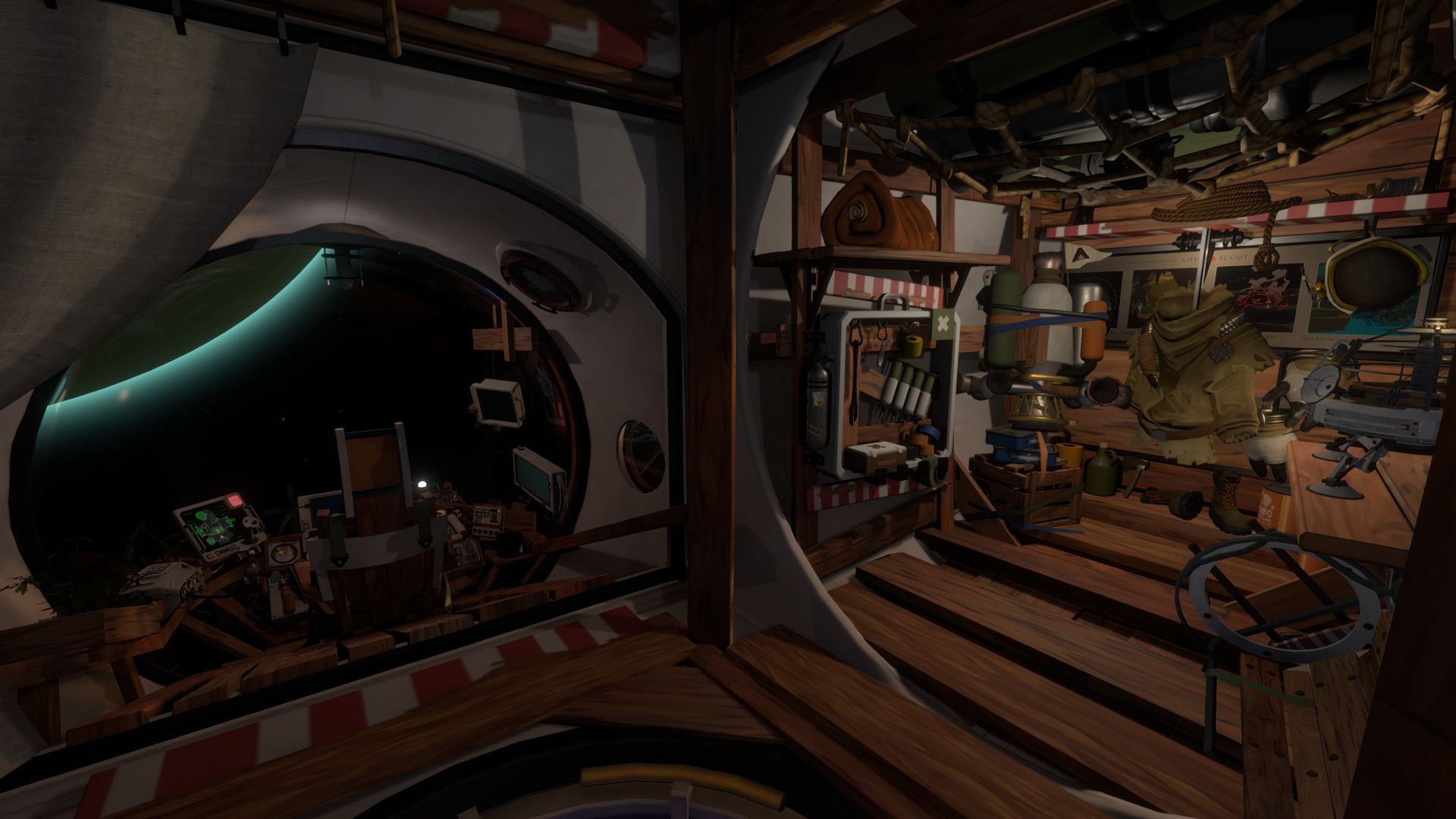
(A quick aside: The Outer Wilds features a universal translator between your language and the language of the ancients. It's the core mechanic of the game, and as someone who studied linguistics, it's the most unrealistic part about this game, and this is a game where time is stuck in an eternal loop. Nobody cares about this but me. Moving on...)
The story of the Nomai, their culture, and their legacy, is as touching as it is existential. There are fragments of relationships, politics, customs, past-times. The Outer Wilds builds a connection between you and a society long extinguished, a relationship between you and persons you'll never speak with and never see, and yet intimately understand. You understand their goals and their fears, the clashing personalities in the society, the friendships and rivalries at work in this dynamic civilization now erased. In this article, I wrote so many words praising the experiential world building of Control. The Outer Wilds rises to its challenge, and meets it differently, but with equal strength and meaning.
The small assortment of planets you explore are diverse in their quirks, each presenting unique exploratory challenges through their mechanics. The miniature worlds feel vast despite being shrunk down for gameplay purposes; even the smallest holds more secrets than seemingly possible for its physical space. While the mechanic of one world I found more frustrating than interesting, the payoff for unraveling it's challenges still instilled a sense of triumph and excitement, followed by the sinking realization of its implications that so many of The Outer Wilds' revelations induce.
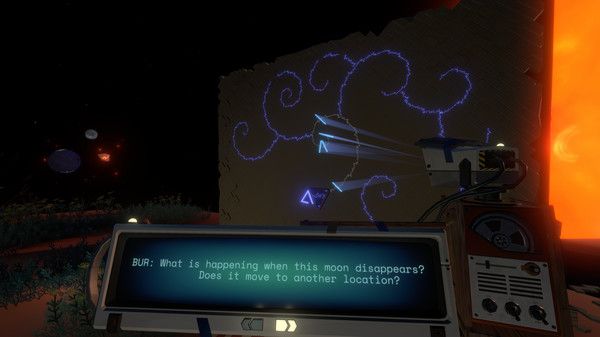
The Outer Wilds succeeds in its non-linear storytelling like no other game, providing the player with an unguided experience that makes Breath of the Wild's "Kill Ganon" quest blush. Every person that I've heard talk about this game has a different story of the path they took after first breaching the atmosphere of Timber Hearth, each jumping to different conclusions as the strands of narrative present so many possibilities before finally weaving together so cleanly and profoundly that I had to pause a moment to come to terms with it all. I did not like the ending of The Outer Wilds. I think it's because, to me, the Outer Wilds was not about cosmic mysteries left unsolved, but the legacy of a culture long buried, yet still remembered.
Play it. It's good. I can't say any more.